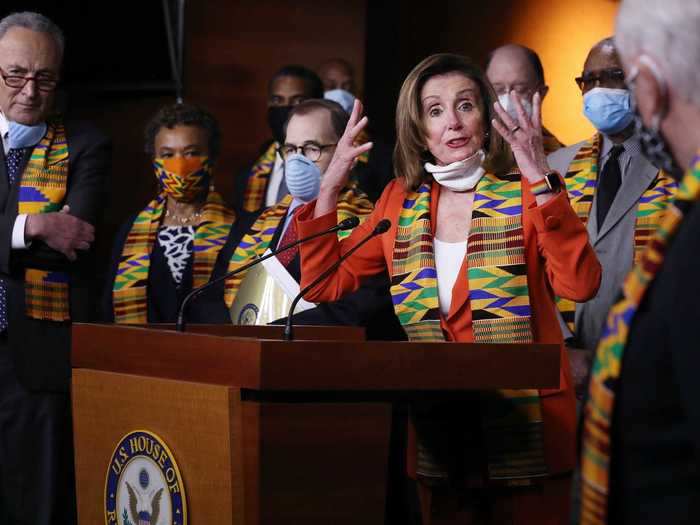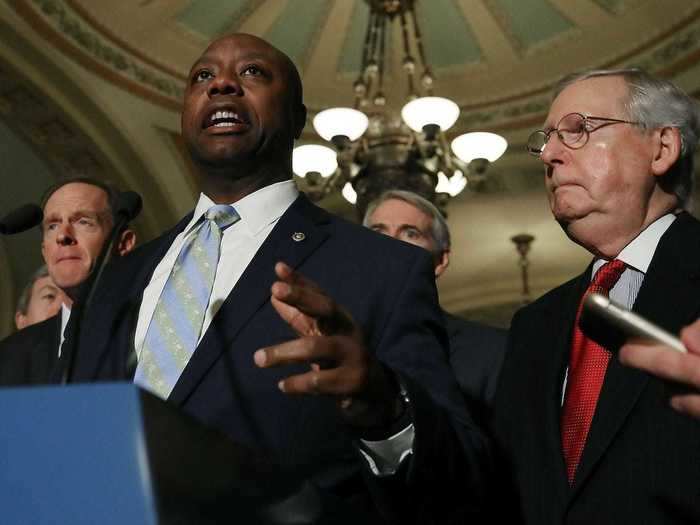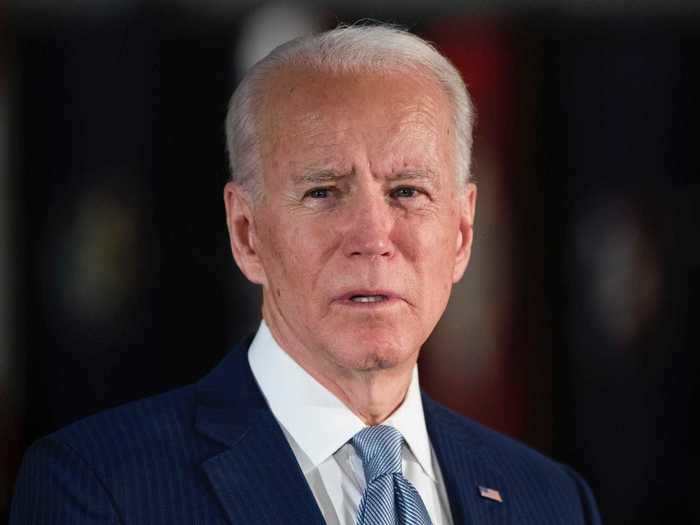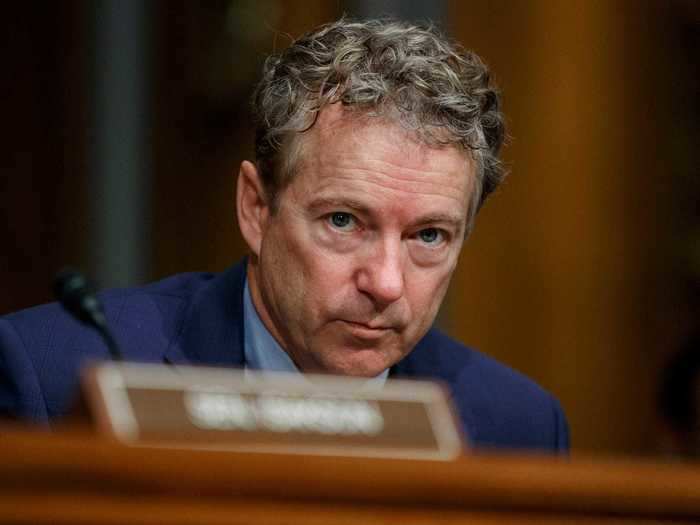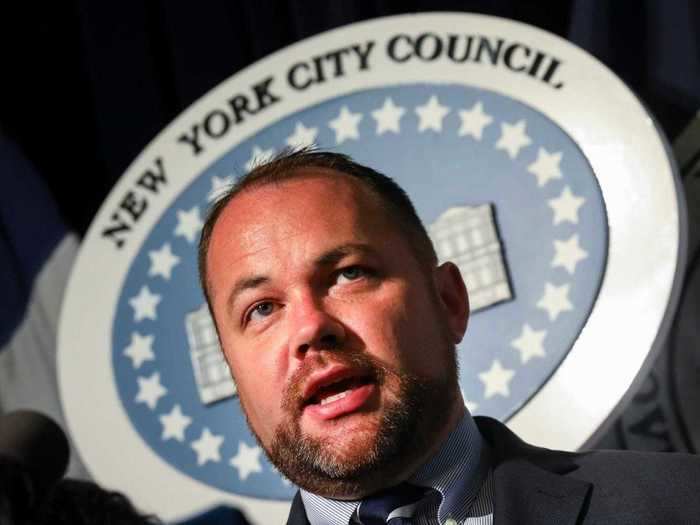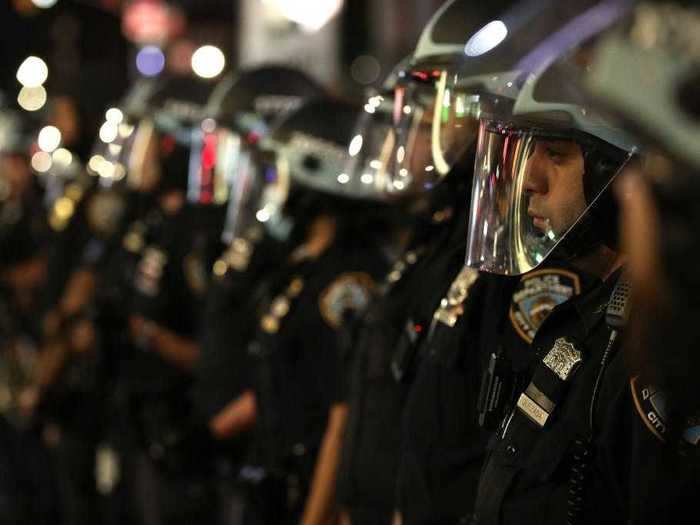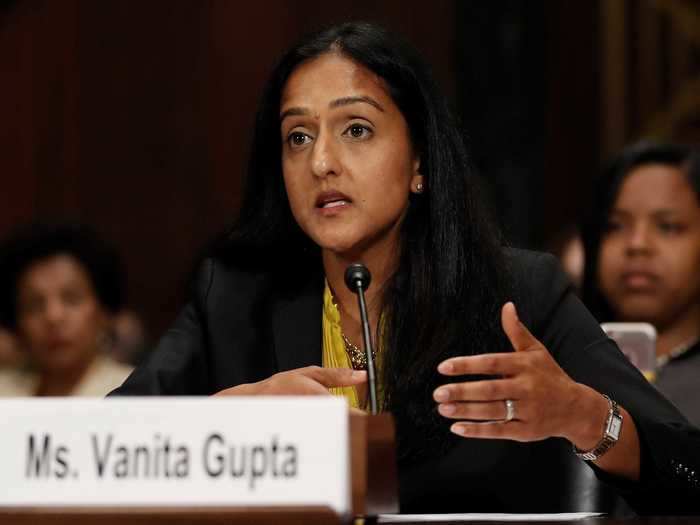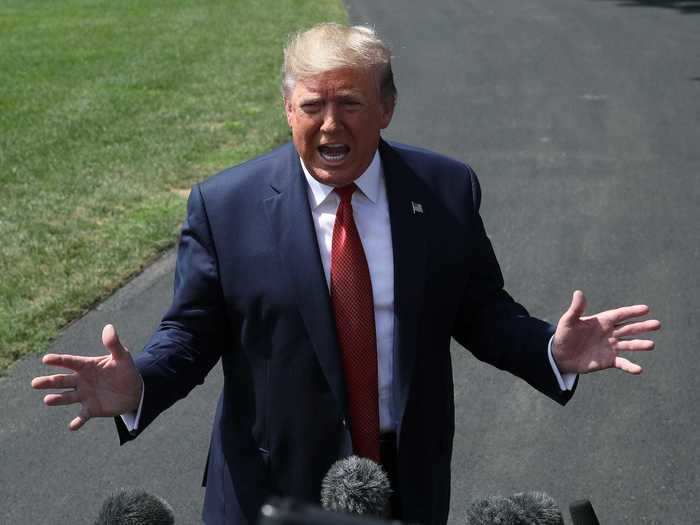A police officer patrols during a protest in support of the Black lives matter movement in New York on July 9, 2016.KENA BETANCUR/AFP via Getty Images
- Nationwide protests against racism and police brutality have heightened calls for national police reform.
- Many activists and progressive lawmakers are calling for a national defunding of the police and the redistribution of resources to social services, including education and healthcare.
- Democrats in Congress have crafted a sweeping bill that would boost police accountability and end certain controversial law enforcement tactics. The president is set to sign an executive order implementing some incremental changes.
- Here's what 10 prominent activists, experts, and lawmakers are calling for.
Protests across the country sparked by the May 25 death of George Floyd have heightened calls for national police reform.
Many activists and progressive lawmakers are calling for a national defunding of the police, and the redistribution of resources to social services, including education and healthcare. Some are calling for abolishing police departments altogether and replacing them with other forms of community protection.
House Democrats have put forward the Justice in Policing Act, the most sweeping set of law enforcement reforms proposed by Congress in recent decades, which calls for boosting police accountability and ending certain controversial law enforcement practices like chokeholds and no-knock warrants in drug cases.
While a handful of congressional Republicans have voiced support for incremental reforms like banning chokeholds and mandating the use of body cameras, President Donald Trump has downplayed calls for sweeping change. Senate Republicans, led by Sen. Tim Scott and James Lankford, are reportedly set to unveil their own police reform proposal on Wednesday.
Some states and cities have already passed measures and repealed laws in order to overhaul local policing.
Here's what 10 prominent voices are calling for:
Black Lives Matter co-founder Alicia Garza is calling for national defunding of police and the reallocation of resources to social services, including housing and healthcare.
Black Lives Matter co-founder Alicia Garza
Earl Gibson III/Getty Images
"So much of policing right now is generated and directed towards quality-of-life issues, homelessness, drug addiction, domestic violence," Garza told NBC News.
"What we do need is increased funding for housing, we need increased funding for education, we need increased funding for quality of life of communities who are over-policed and over-surveilled."
House and Senate Democrats are calling to ban chokeholds, end no-knock warrants in federal drug cases, and create a national police misconduct registry.
Speaker of the House Nancy Pelosi (D-CA) joins fellow Democrats from the House and Senate to announce new legislation to end excessive use of force by police across the country.
Chip Somodevilla/Getty Images
House Democrats have put forward the Justice in Policing Act, the most sweeping set of law enforcement reforms proposed by Congress in recent decades. It focuses on increasing police accountability and curbing some of the most harmful police tactics.
The bill would put an end to qualified immunity, which protects law enforcement from civil lawsuits, create a higher federal use of force standard, log a national registry of police misconduct, and ban chokeholds and no-knock warrants.
House leaders have rejected calls to defund police departments.
"We want to work with our police departments," House Speaker Nancy Pelosi said last week. "There are many things we call upon our police departments to deal with — mental health issues, policing in schools and the rest — that we could rebalance some of our funding to address some of those issues more directly. But this isn't about that."
Senate Republicans, led by Sen. Tim Scott, support significantly less far-reaching reforms, which they're preparing to unveil in new legislation this week.
Tim Scott (R-SC) speaks to reporters
Mark Wilson/Getty Images
Some of the measures in the GOP reform bill will reportedly be similar to those in the Democratic bill, including a national database of law enforcement misconduct, a ban on neck restraints and no-knock warrants, and lowering the legal bar for civil lawsuits against officers.
But Republicans have rejected other measures proposed by Democrats, including ending qualified immunity, which Scott has called a "poison pill" for the GOP.
Joe Biden, the presumptive Democratic presidential nominee, wants to spend $300 million more on community policing.
Presidential candidate Joe Biden is seen on March 10, 2020.
Matt Rourke/AP
Biden said he doesn't support calls to defund the police, but that funding should be conditional on the department's standards.
"I support conditioning federal aid to police based on whether or not they meet certain basic standards of decency and honorableness and in fact are able to demonstrate they can protect the community and everybody in the community," Biden told CBS News last week.
Biden announced last week that he's calling for an additional $300 million in federal funding "to reinvigorate community policing." He also wants to see increased investment in "mental health services, drug treatment and prevention programs, and services for people experiencing homelessness," he wrote in a USA Today op-ed.
"That may also mean having social service providers respond to calls with police officers," Biden added.
While many progressives are calling to reduce police interaction with Black and brown communities, Biden has long argued that more police on the streets improves safety.
And Biden's record on policing and criminal justice policy has long been scrutinized by progressives, who point to the 1994 crime bill he championed as a reason for mass incarceration, harsh sentencing, and the criminalization of poverty.
Sen. Rand Paul, a Kentucky Republican, wants to 'stop the federal militarization of local police departments' and end no-knock warrants, like the one that led to Breonna Taylor's killing in Louisville.
Sen. Rand Paul
Carolyn Kaster/AP
Paul is drafting legislation that would ban no-knock warrants, which allow police to enter without identifying themselves and the reason for their entry. He said he was motivated by the March killing of Breonna Taylor, who was shot by police that raided her apartment without a warrant in the middle of the night.
"After talking with Breonna Taylor's family, I've come to the conclusion that it's long past time to get rid of no-knock warrants," he said. "This bill will effectively end no-knock raids in the United States."
Paul also supports a bipartisan bill, the "Stop Militarizing Law Enforcement Act," that calls to ban the transfer of military weapons to local police departments.
"I support our officers, but I do not believe it is beneficial for neighborhoods across the United States to have the same kind of military-grade weapons that are commonly used in Afghanistan," Paul told Business Insider in a statement.
Notably, Paul has controversially prevented a federal anti-lynching bill from becoming law, arguing that it defines lynching too broadly.
Rep. Alexandria Ocasio-Cortez of New York has joined protesters' calls to defund police departments and redistribute funding to social programs, including education, healthcare, and homelessness services.
FILE - In this July 26, 2019 file photo, Rep. Alexandria Ocasio-Cortez, D-N.Y., attends a House Oversight Committee hearing on Capitol Hill in Washington. Ocasio-Cortez says she wants to hear Democratic hopeful Joe Biden speak in detail on how to provide health care for everyone. The freshman congresswoman from Queens, New York tells The Associated Press that Biden is “struggling” with millennials and people of color and needs to describe how he'd preserve Medicare, for example, for people who won't need it for decades. (AP Photo/J. Scott Applewhite)
Associated Press
"Affluent white communities already live in a world where they choose to fund youth, health, housing etc more than they fund police," Ocasio-Cortez wrote in a recent Instagram story, answering a question posed to her about what defunding police would look like.
She went on: "These communities have lower crime rates not because they have more police but [because] they have more resources to support a healthy society in a way that reduces crime."
NYC Council Speaker Corey Johnson wants to make 'significant cuts to the NYPD budget and reinvest that money in communities' and 'get cops out of schools, out of homeless services, and out of mental health.'
Getty
"We need to fundamentally change the relationship between police and the cities, towns, and states they serve. Here in NYC, we plan to start by making significant cuts to the NYPD budget and reinvesting that money in communities, but we also need to bring transformational, structural change to how the NYPD operates," Johnson said in a statement to Business Insider.
He added, "Police do not need to be the front-line responders to every problem in the City. We need to get cops out of schools, out of homeless services, and out of mental health. We must replace them with people trained to serve with empathy and compassion instead of law enforcement. And we need to make sure that communities of color lead the way on this redesign from beginning to end."
Ed Mullins, president of the NYPD Sergeants union, supports ending arrest quotas, expanding police departments' Big Brother Big Sister programs, and creating 'public service announcements' that 'explain what transpires during a police encounter.'
New York Police Department (NYPD) officers gather during a rally on May 31, 2020 in New York City. Protesters demonstrated for the fourth straight night after video emerged of a Minneapolis police officer, Derek Chauvin, pinning Floyd's neck to the ground. Floyd was later pronounced dead while in police custody after being transported to Hennepin County Medical Center. The four officers involved have been fired and Chauvin has been arrested and charged with 3rd degree murder.
Justin Heiman/Getty Images
In a statement to Business Insider, Mullins also called for the "best standards" for policing and better training for officers.
"In order to make any significant change in the divide amongst race and police a great deal of focus needs to be applied on the following: a) Freedom Political and Economic, b) Opportunity, c) Economic Growth, d) Quality of Life, e) Education," he concluded.
Mullins, a controversial figure who circulated a racist video last year, is being investigated by the NYPD after he declared "war" on NYC Mayor Bill de Blasio amid the police brutality protests.
The Leadership Conference on Civil and Human Rights, along with several hundred civil and human rights groups, is calling for eight key policing reforms, including a national use of force standard, a ban on chokeholds, and an end to racial profiling.
Vanita Gupta.
AP Photo/Carolyn Kaster
The coalition of more than 200 national civil and human rights groups are also calling for an end to federal programs that transfer military equipment to local law enforcement, a ban on no-knock warrants, a change to the legal standard in order to hold police accountable for illegal conduct, a national misconduct database, and an end to qualified immunity for police.
Most of the organizations' eight demands overlap with the House police reform bill.
"When we stop using criminal justice policy as social policy, we will make communities safer and more prosperous," Leadership Conference president Vanita Gupta told Congress this week.
President Trump is preparing to release an executive order that he says 'will encourage police departments nationwide to meet the most current professional standards for the use of force, including tactics for de-escalation.'
Mark Wilson/Getty Images
The Trump administration has denied the existence of systemic racism in policing, and Trump has said that a few "bad apples" are to blame for police violence.
Of his executive order, the president said it will boost funding for law enforcement.
"We're not defunding police. If anything we're going the other route," Trump said during a meeting with law enforcement in Dallas last week. "We're going to make sure our police are well trained, perfectly trained, they have the best equipment."


